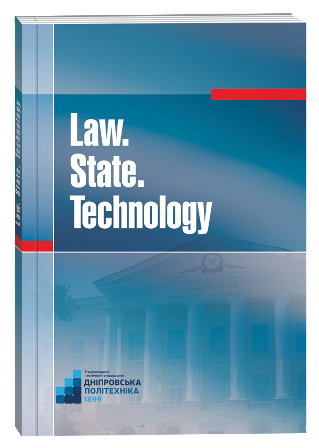FEATURES OF APPLICATION OF THE CONCEPT OF GUILT OF THE TAXPAYER AT THE PRESENT STAGE
DOI:
https://doi.org/10.32782/LST/2021-4-14Keywords:
guilt, taxpayer, tax offenses, intent, financial responsibility.Abstract
Purpose of work. Determine on the basis of the achievements of financial and legal science the essence of the conceptual provisions of the guilt of taxpayers and the importance of intent in tax offenses, to show the degree of their implementation in the tax legislation of Ukraine. Methodology. The study was the use of a set of general and special methods of scientific knowledge. The dialectical method is used to identify the content of the concepts of “guilt in tax law”, “intent in a tax offense”, to establish their relationship with the relevant concepts of other branches of law. Methods of system-structural and structural-functional analysis were used in the study of the main trends, features and main problems of application of the concept of guilt of the taxpayer for the offense. Scientific novelty. The results of the study are to reveal the main doctrinal approaches to understanding the concept of guilt of the taxpayer and the signs of guilt as an element of the offense, which allowed to outline the features of their application at the present stage. Through the analysis of domestic legislation to establish the guilt of a person revealed certain differences in the understanding of guilt in tax law and other areas of law as a condition of liability for the offense. Conclusions. The study concluded that the need to legislate the definition of guilt in tax law, it is necessary to proceed from its behavioral concept, rather than a subjective attitude to the tax offense. It is proposed to consider intent to commit an act as a qualifying feature of a tax offense aimed at non-compliance with the tax obligation in order to create conditions for non-compliance with the law. The analysis of the norms of the tax legislation allows to assert the necessity in establishing the guilt of proving the criteria of unreasonableness, dishonesty and carelessness in their totality, if the payer had the opportunity to behave properly. However, these criteria are evaluative concepts, the content of which should be determined in each case.
References
Иванов И.С. Институт вины в налоговом праве : дисс. … канд. юрид. наук : 12.00.14 ; Российская правовая академия. Москва, 2006. 213 с.
Федоров М.О. Вина як обов’язкова умова відповідальності у фінансових правовідносинах. Наука і право. 2013. № 3. С. 202–209.
Музика-Стефанчук О.А. Фінансове право : навч. посіб. 3-тє вид., допов. і переробл. Київ : Атіка, 2007. 264 с.
Проєкт Закону про внесення змін до Податкового кодексу України щодо вдосконалення адміністрування податків, усунення технічних та логічних неузгодженостей у податковому законодавстві від 30.08.2019 р. № 1210. URL: https://w1.c1.rada.gov.ua/pls/zweb2/webproc4_1?pf3511=66520 (дата звернення: 01.07.2021).
Ханова Р., Барікова А. Оновлена концепція вини в податковому праві. Судово-юридична газета. URL: https://sud.ua/ru/news/blog/199581-onovlena-kontseptsiya-vini-v-podatkovomu-pravi# (дата звернення: 20.05.2021).
Поляничко А. Умисел в податкових правопорушеннях – що таке і навіщо? Юридична практика. URL: https://pravo.ua/umysel-v-podatkovykh-pravoporushenniakh-shcho-take-i-navishcho/.
Мінін О. Фактичне запровадження законопроєктом 1210 презумпції винуватості всупереч Конституції та міжнародним зобов’язанням України URL: http://kmp.ua/uk/blog/factual-embedding-of-thepresumption- of-guilt-by-the-draft-law-no-1210-in-violation-of-the-dra/.








